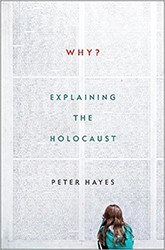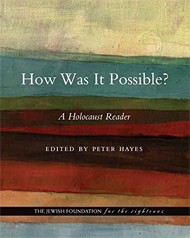Earlier this week, Peter Hayes introduced readers to the teachers named in the dedication and acknowledgements to his book Why?: Explaining the Holocaust. Peter is guest blogging for the Jewish Book Council all week as part of the Visiting Scribe series here on The ProsenPeople.
While writing Why?: Explaining the Holocaust, I tried to address two groups of readers at once: people new to the subject, and people well informed about it. My goal was to open understanding to novices and to extend or sharpen the knowledge of veterans. Readers will decide whether I succeeded in this chancy undertaking. But the effort made me think about authors who have done so. What other books on the subject can be recommended as both readable and reliable to both newcomers and old hands?
Of course, the classic such works — e.g., several by Primo Levi, Saul Friedländer’s two-volume Nazi Germany and the Jews, and Christopher Browning’s Ordinary Men—remain indispensable, but I can think of a number of lesser known or newer titles that should have similar resonance.
Let me start with three outstanding books that emerged from family histories and powerfully foreground personal experience, Edmund de Waal’s elegiac The Hare with Amber Eyes (2010), Göran Rosenberg’s searing A Brief Stop on the Road from Auschwitz(2012), and Modris Ekstein’s harrowing Walking Since Daybreak (1999). De Waal artfully portrays the rise and dispersal of a European Jewish family through the story of one of their possessions, a collection of miniature Japanese carvings (netsuke). Rosenberg tells the story of his father, a survivor of the death camp and much else, as he tries to rebuild life in postwar Sweden and descends into despair and suicide. Ekstein, a non-Jewish Latvian who became an accomplished historian in Canada, immerses you so intensely in the cauldron of conflicts in his native region during the era of the World Wars that you feel its multi-dimensional tragedy. When you reach the end of each of these profound and graceful books, you will want to start again — when you can bear to.
My other recommendations consist of knowledgeable and accessible responses to central questions about the Holocaust. Certainly high on any such list is “How does a country become a persecuting society?” as Germany did after 1933. To get an answer, you could hardly do better than to start with Thomas Kühne’s aptly titled Belonging and Genocide (2010), a disturbing demonstration of the dark side of community-building. Another such question is “What kind of people could do such things?” Two illuminating sets of answers emerge from Bettina Stangneth’s Eichmann Before Jerusalem (2014), a book that exposes not only the mentality of a murderer, but also the origins of Holocaust denial, and Wendy Lower’s Hitler’s Furies (2013), which shows that women were not immune to corruption.

Why We Watched: How Anti-Semitism in the Allied Nations Allowed Hitler to Exterminate European Jewry
In recent years, much of the “action” in Holocaust studies has centered on issues of complicity on the part, to take the most controversial examples, of non-Jewish Poles, foreign governments, the Catholic Church, and even American businesses, both in and outside of Germany. Journalist Anna Bikont’s excellent The Crime and the Silence (2015) is about both what some Poles did to Jews during the war and how stubbornly many Poles have resisted acknowledging such acts ever since. The late Theodore Hamerow’s Why We Watched (2008) draws on numerous contemporary sources in assembling the most vivid and comprehensive account available of how Europeans and Americans justified doing so little to aid Jews. A worthy supplement to his book is Richard Breitman and Allan J. Lichtman, FDR and the Jews (2013), which reminds us, despite the biographical focus of the title, that the American public deserves more blame for the shortcomings of national policy than the president at the time. On the choices made by the Papacy and American investors, the sharpest, most absorbing studies are David Kertzer The Pope and Mussolini (2014), which deservedly won a Pulitzer Prize, and Thomas Doherty, Hollywood and Hitler 1933 – 1939 (2013).
Two fine and concise new books with great pertinence to the present are Deborah Lipstadt’s Holocaust: An American Understanding (2016), which perceptively traces how and why the Holocaust became a prominent theme in American culture, and Michael Marrus’s, Lessons of the Holocaust(2016), a well-reasoned warning against drawing them too readily.
Finally, I want to draw renewed attention to my personal favorite among the pioneers of Holocaust studies, Yehuda Bauer. To experience the good sense, limpid writing, and sharp judgment that he brought to the subject for decades, read Rethinking the Holocaust(2001), a collection of thoughtful topical essays. You will be able almost to hear the British-accented voice of this wise and articulate man as he converses with you.
Peter Hayes currently chairs the Academic Committee at the United States Holocaust Memorial Museum and was from 1980 to 2016 Professor of History and German and from 2000 to 2016 Theodore Zev Weiss Holocaust Educational Foundation Professor at Northwestern University. He writes and lectures widely on German and Holocaust history in the United States and abroad.
Related Content:
- Menachem Z. Rosensaft: Dawn Follows Event the Darkest of Nights: A Legacy of Remembrance
- Gwen Edelman: In My Characters’ Shoes
- Marcia Weiss Posner: Once Upon a Time, Granny Went to the Ovens…”





















